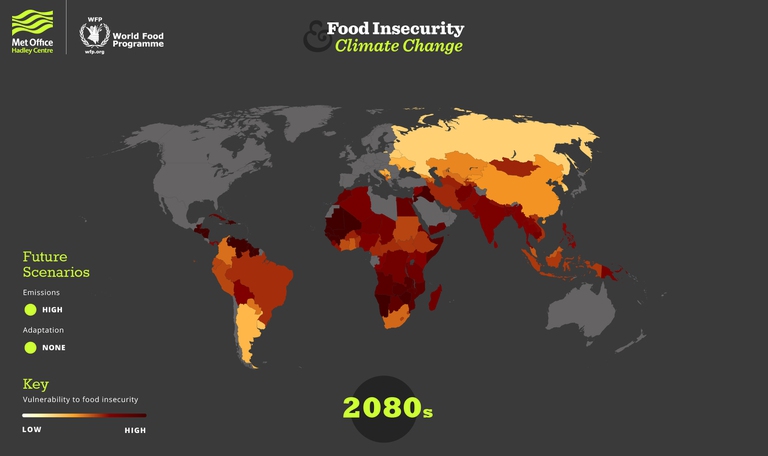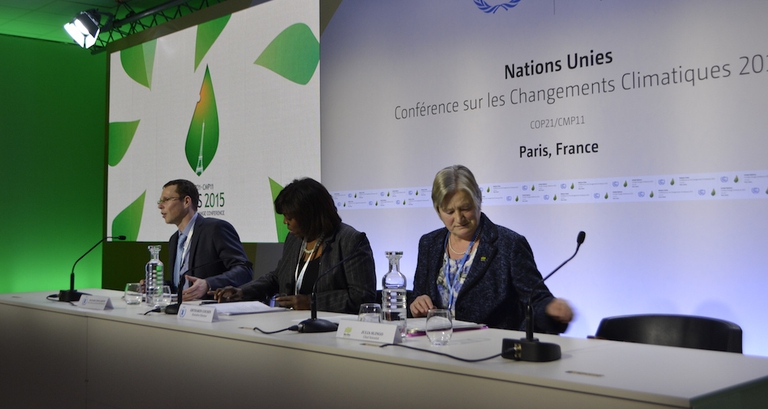
The 26th edition of the United Nations Climate Change Conference, COP26, will be held in Glasgow, Scotland in November 2020. The pre-COP will take place in Milan, Italy.
Il World Food Programme ha presentato, alla Cop 21 di Parigi, un nuovo indicatore che misura l’impatto dei cambiamenti climatici sulla fame nel mondo.
How climate change will affect food security and, by consequence, the fight against world hunger over the next decades? A new indicator, presented at COP21 in Paris by the World Food Programme (WFP) and the UK research institute Met Office Hadley Centre, explains it.
The two institutions have calculated how food insecurity rate will change across the countries most affected. An online instrument allows you to explore future scenarios of global greenhouse gas emissions and adaptation to climate change. Both factors (emissions and adaptation) can have three levels (low, medium, and high) and allow exploring two future time periods: 2050 and 2080.
“To create the maps – explains Richard Choularton, Chief of WFP’s Climate and Disaster Risk Reduction Programmes Unit – we’ve used a wide range of information, related to agricultural systems, access to drinking water, effects of climate change on forests, and how different areas provide food”. For instance, supposing that over the next decades CO2 emissions will be still high and that adaptation policies of the countries most affected by food insecurity will be insufficient, it is possible to verify that situation will worsen in a devastating way. In India, South Eastern Asia, Africa, Central America, and some countries of Latin America, the situation could become catastrophic.
“This instrument – said Ertharin Cousin, WFP Executive director – allows us to understand how hunger will change across the world depending on the actions that will be taken to curb climate change. The scenario we are facing shows that environmental problems will multiply risks for hundreds of thousands of people, if effective adaptation policies are not implemented and if greenhouse gas emissions are not cut”.
Investing in only one of the two factors won’t be enough: data indeed show that implementing effective adaptation policies yet registering high levels of emissions (or vice versa), populations of tens of countries won’t be able to escape hunger. “It is an alert,” ended Cousin. “The good news is that we know that future is in our hands”.
Siamo anche su WhatsApp. Segui il canale ufficiale LifeGate per restare aggiornata, aggiornato sulle ultime notizie e sulle nostre attività.
![]()
Quest'opera è distribuita con Licenza Creative Commons Attribuzione - Non commerciale - Non opere derivate 4.0 Internazionale.
The 26th edition of the United Nations Climate Change Conference, COP26, will be held in Glasgow, Scotland in November 2020. The pre-COP will take place in Milan, Italy.
Thanks to activists, the voice of the world’s peoples resounded through the COP25 like an alarm bell. Governments didn’t reach the results they demanded, but their cries and messages were stronger than ever, reaching even those who weren’t in Madrid.
Climate change poses a risk for millions. However, women are the most vulnerable to its negative consequences: a few simple considerations by the Italian Climate Network help us perceive the global implications of this.
The COP25 ended two days late and with very few steps ahead made. Climate negotiations in 2020 will be an uphill battle as political will clearly seems to be lacking, once again.
The last ten years have been the most “exceptional” and hottest decade ever, with extreme weather hitting people and ecosystems harder and more frequently. 2019 is also on course to becoming the second or third hottest year since records began.
Unite Behind the Science: this was the title of the conference held at the COP25 on 10 December. Greta Thunberg’s presence filled the arena, but this time it was scientists’ turn to speak.
25,000 delegates meet for the COP25 from 2 to 13 December. What can we hope this UN climate change conference, whose venue was changed from Santiago de Chile to Madrid, will achieve?
100 eminent people from all over the world, including Vandana Shiva, Naomi Klein and Noam Chomsky, have signed an open letter after the disappointing results of the COP24. A call-to-arms for climate against world leaders’ indifference.
The outcome of the COP24 in Katowice left many unsatisfied. Greta Thunberg, a young Swedish environmental activist, gave a harsh, heartfelt speech addressing world leaders.










